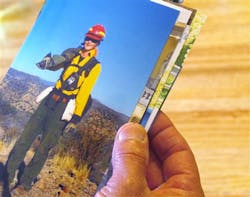Wildland Firefighter's Death Raises Safety Questions
Source Spokesman Review (Spokane, WA)
BOISE, Idaho -- The death of an Idaho firefighter has spurred safety questions among top state officials about battling wildfires.
Attorney General Lawrence Wasden noted concerns about communications and coordination by the state Department of Lands on the Steep Corner fire in North Idaho. A falling tree killed Anne Veseth, a 20-year-old from Moscow working as a U.S. Forest Service firefighter.
A Forest Service Hot Shot crew from Montana had refused to work on the fire a day before Veseth's death. It cited hazards, including burning tree snags and questions about managing the fight against the fire.
"I'm concerned for our own crews, making sure they have the communication, organization," Wasden said. He asked state forester and fire official David Groeschl during a Tuesday meeting of the Idaho state Land Board: "Do you feel satisfied with the communication, coordination and organization that we have, that it would protect our firefighters?"
Groeschl responded, "We are very diligent."
Crews receive extensive training and protective gear, Groeschl said. "I am very proud and very confident in our folks and what they do out there."
He noted that firefighting is risky. "We will continue to, as much as we can, ensure the safety of our firefighters."
Idaho Gov. Butch Otter, who chairs the Land Board, said, "I think for the entire board, the attorney general pretty well expressed our concern."
Otter noted that he was a wildland firefighter himself many years ago. "There is serious concern about this," he said. "But fires are inherently dangerous and unpredictable, which is one of the reasons I felt it necessary to mobilize the Guard."
Otter last week declared a statewide disaster due to wildfires, allowing the Idaho National Guard to be mobilized to help fight the fires and provide support. That includes a medical evacuation crew with a helicopter standing ready to evacuate injured firefighters or others.
Groeschl offered condolences on Veseth's death and noted that the state Lands Department is conducting one of four investigations into it. The other investigations are led by federal agencies, including OSHA and the Forest Service law enforcement branch.
The Montana-based Flathead Hotshots' report about concerns on the fire was posted on SAFENET, an anonymous federal reporting system for wildland firefighters to document their concerns, according to the Associated Press and the Lewiston Tribune, which first reported on it Monday.
The report describes a chaotic scene, with a "hodge-podge" of firefighters - including a crew of Idaho state prison inmates - forced to dodge trees and rocks hurtling down a steep mountainside.
The inmate crew "had been chased up the hill several times due to fire below them and big rocks coming down the hill," according to the report. "At this time a huge snag came down above us and started rolling down through the standing trees. The prison (crew boss) commented, 'That is the sound of the day.'"
Veseth was a Clearwater National Forest firefighter in her second season.
The SAFENET report, while just one account of the Steep Corner fire, suggests tension between the federal firefighters and members of the Clearwater-Potlatch Timber Protective Association, a state group under the Idaho Department of Lands formed to fight forest fires in North Idaho.
Howard Weeks, the Clearwater-Potlatch Timber Protective Association's chief fire warden, told the AP that the Flathead Hotshots made several "good recommendations" about improving safety at the Steep Corner fire. Weeks said many of them were put into effect by Aug. 12, before Veseth died.
Asked if more should have been done, Weeks called Veseth's death "a very unfortunate tragic accident" but said even the most prudent precautions can't erase all potential dangers when the forest burns.
"When fires transition from this initial attack to the extended attack phase, often there are hazards that need to be mitigated," said Weeks, who has 35 years of firefighting experience. "We do our best to mitigate what's possible. All risk that we're exposed to cannot always be mitigated."
The Associated Press contributed to this report.









